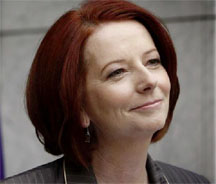CANBERRA, (Reuters) – Kevin Rudd was sworn in as Australian prime minister for the second time yesterday, a day after toppling Julia Gillard and three months out from scheduled elections with polls suggesting the ruling Labor Party is staring at a devastating defeat.

Rudd’s resurrection as prime minister comes after three years of bitter infighting within the Labor leadership and as the world’s 12th largest economy faces challenges from a slowdown in top trade partner China.
Late on Wednesday Rudd, a Mandarin-speaking former diplomat, highlighted the difficulties associated with “the end of China’s resource boom” and said he would work to rebuild the government’s strained relations with the business community.
He made no mention of whether he would change policy or bring forward elections due on September 14.
Australian business was scathing of the political instability and called on Rudd to abandon laws which strengthen trade union access to the workplace and which tighten rules for temporary skilled immigration.
“Our tolerance factor with instability in the leadership of Australia’s government is at breaking point, matched only by a swathe of anti-business policies which have brought business frustration to boiling point,” said Australian Chamber of Commerce and Industry chief executive Peter Anderson.
“The economic challenges facing Australia, especially our declining competitiveness, high cost structure and low confidence, are serious.”
Rudd’s first task will be a major cabinet reshuffle after a string of senior ministers loyal to Gillard resigned from the cabinet, including former deputy prime minister and treasurer Wayne Swan, Trade Minister Craig Emerson and Climate Change Minister Greg Combet.
Immigration Minister Chris Bowen was sworn in as Treasurer and Transport Minister Anthony Albanese was sworn in as deputy leader yesterday, after Rudd won an internal party ballot to oust Australia’s first female prime minister.
Financial markets see few implications for the $1.5 trillion economy, which is struggling to cope with the end of a historic mining boom as commodity prices fall and a record pipeline in resource investment starts to falter.
Manufacturing has been hurt by a strong Australian dollar and other sectors of the economy are struggling to pick up the slack as the mining bonanza fades.










